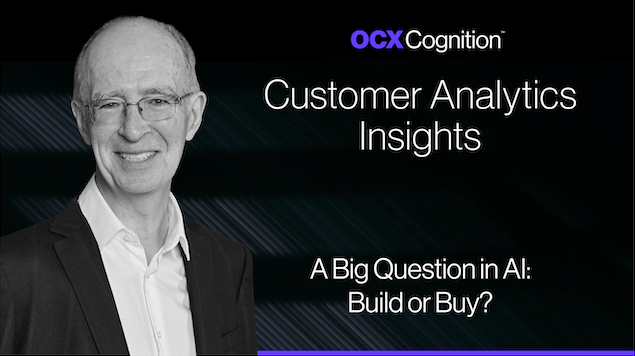A Big Question in AI: Build or Buy?
AI continues to be a hot topic and just about every corporate IT team wants to be able to say they are working on an AI project. Looks great on their CV / resume. And I suppose a team that delivers even a small AI project will be rewarded more than a team taking care of that new accounting software, when it comes to annual review time.
However, if you manage a product, service, or major function such as sales for your company, the decision to build or buy AI software that will improve customer retention and growth is a big one. Should you buy something off the shelf, or have an internal team build it for you?
I could give you all sorts of data-driven, complex answers to this question and I would rather not. I like to use metaphors. In this case, let’s suppose you own a plot of land and you want a new house. Your extended family is enthusiastic about the new project, and two (of the 30 people on the list) have already worked in construction. Their message is clear “We know how to do this. We can get the whole family together to build it for you. The tools we can buy down at the DIY store are the same as the professional builders use. We guarantee that the result will be as good as what that builder you have in mind can do and we can do it a lot more cheaply.”
So . . . should you build or buy?
The questions to ask are fairly simple:
- Have they built this type of house before?
- When do you need it done? (You really should not believe it when they tell you can do it as quickly as external teams who have done it all before.)
- Do you really think that your family using a bunch of fancy and often quite expensive tools for the first time can use them as well as professionals who have years of experience with those tools?
- Does your family team understand all of the latest building regulations?
- When it’s complete and you find things that need to be improved, will they still be around to do that?

The house-building metaphor has its limits in this case. An additional fact that matters a lot for your AI decision is this: According to research by Dr. Robert G Cooper about 80% of AI projects fail, mostly for “dumb reasons”.
I could keep going. The message is clear: there are things you simply should not do on your own if you lack experience and need results quickly. There are indeed exceptions, rare occasions where the level of detailed knowledge required to produce a great result is extreme and only your team has it. Such leading edge (probably meaning ‘bleeding edge’) cases are really rare. When you are planning your first major project in a new area, you generally reduce risks of all kinds by working with experienced third parties. Naturally, I am going to add that if you want to implement an AI solution that uses attitudinal, operational, and customer profile data to improve customer retention and growth, look no further than Customer AI from OCX Cognition for your first major project in the space.
Notes
OCX Cognition predicts customer futures. Our breakthrough Customer AI solution lets enterprises transform what’s possible in customer experience. Reduce your customer risk, break down silos, and drive speedy action – when you can see what’s coming, you can change the outcome. Building on more than 100 years of CX-focused expertise in our small team and thousands in teams we have led, we’ve harnessed today’s advances in AI, elastic computing, and data science to deliver on the promise of customer-driven financial results. Learn more at www.ocxcognition.com.
Maurice FitzGerald is Editor-in-Chief, Content at OCX Cognition. He retired from HP where he was VP of Customer Experience for their $4 billion software business and was previously VP of Strategy and Customer Experience as well as Chief of Staff for HP in EMEA. He and his brother Peter, an Oxford D.Phil in Cognitive Psychology, have written three books on customer experience strategy and NPS, all available from Amazon.



